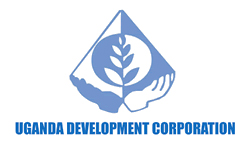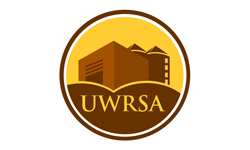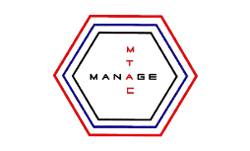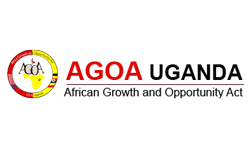Uganda Calls for Increased Intra-LDCs Trade at UNCTAD 14
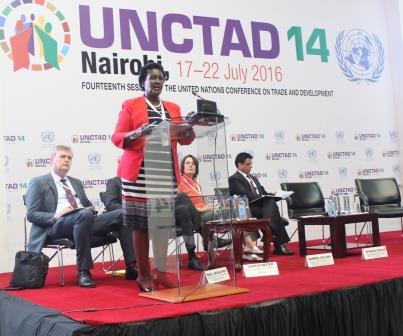
Uganda has called for improved trade amongst the Least Developed Countries (LDCs) saying it is the only way LDCs will be able to achieve the Sustainable Development Goals (SGDs) by 2030.
Delivering her statement during a general debate on how to achieve the Agenda 2030 at the ongoing 14th United Nations Conference on Trade and Development (UNCTAD 14) in Nairobi, Kenya, the head of Uganda’s delegation and Minister of Trade, Industry and Cooperatives Hon. Amelia Kyambadde said there is need and urgency to improve the infrastructural inter-connectivity amongst LDCs in order to address the low level of intra trade among these countries.
Kyambadde was giving Uganda’s position on the achievement of the SDGs by 2030.
The UNCTAD 14 Conference is held under the theme: “From decision to action: Moving towards an inclusive and equitable global economic environment for trade and development”.
Minister Kyambadde said this theme challenges all UNCTAD member countries not only to make the right decisions but to implement them for the transformation of all countries, particularly, the LDCs like Uganda.
“It is unfortunate that the total share of Global trade for all LDCs is less than 2% when UNCTAD has existed for more than 50 years. This clearly shows that the disparity continues to expand and the rich continue to get richer and the poor poorer”, said Kyambadde.
She said it ill be very hard for LDCs like Uganda to aspire to deliver the 2030 Agenda for sustainable development when in Africa alone, the total intra-Africa trade is only about 11% of the global trade compared to 50% intra-regional trade in developing Asia and as much as 70% in Europe. He added that it is embarrassing that forty four (44) years since the United Nations classified certain countries as LDCs; only four (4) countries have graduated from this category.
The Minister urged UNCTAD to focus on the needs of the LDCs with the aim of strengthening their role in the global economy on the basis of the principles of justice, equity, inclusiveness and differential treatment.
Kyambadde is convinced that LDCs have the potential to help transform themselves into middle income countries within the foreseeable future if they put emphasis on value addition and consolidate their multilateral trade by promoting technology transfer and industrialization in order to trade in processed goods.
“As LDCs, we must add value to the commodities in which we have comparative advantage so that we do not lose revenue through trading in unprocessed goods. For example, Uganda has coffee, Kenya has horticultural products and tea, Bangladesh has jute and Botswana has beef”, noted Kyambadde.
She urged LDCs to increase their investments in value addition to upgrade their trade from merely raw materials to manufactured products, and also adopt a paradigm shift of investing in their vast natural resources including minerals, tourism, agriculture, women and youth if they are to attain the Sustainable Development Goals by 2030.
Kyambadde said that all tat LDCs need is to create a conducive policy environment to support the Private Sector, vocational skilling of the youth and empowering the women.
“Skills are not rocket science! Why do we run around looking for investors when we can empower our own youth? We need markets and partnerships with organizations like UNCTAD to be able to achieve the Sustainable Development Goals, reiterated the Minister.
She told delegates that Uganda has already programmed to become a middle income country by 2020 through its vision 2040 under the theme: “A transformed Ugandan Society from a Peasant to a Modern and Prosperous country within 30 years”.
She said this vision lays out strategies to address: a weak Private Sector and underdeveloped human resources; inadequate infrastructure; small market; lack of industrialization, underdeveloped services sector and underdeveloped agriculture among others.
“We have invested heavily in Universal Primary Education (UPE) which has raised the Country’s literary rate to 71%. We have adopted affirmative action to empower women in all spheres including education and governance. We have established a dedicated Youth Fund to enhance the capacity and potential of the youth. The development of science and technology has been accorded high status within the National Development Plan”, she explained.
She added that Uganda has embarked on aggressive investment and development of her infrastructure especially roads, energy, ICT and railway. And within the East African Community, there is great momentum to upgrade our rail inter-connectivity from the Colonial narrow gauge railway to the Standard Gauge Railway.
The Minister proposed ten areas that UNCTAD should focus on if it is to make tangible contribution towards Agenda 2030. These include; enhancing skills development; promoting industrialization; value addition; promoting Micro Small and Medium Enterprises (MSMEs) development; mobilizing women and youth into SDGs activities; mobilizing domestic resources for investment; embracing functional and effective regional integration in our respective continents; promoting and expanding intra LDC trade; strong support to the Private Sector and promoting trade in services.
She urged UNCTAD to focus on partnering with LDCs in supporting them with research and development, technical assistance in skills development, value addition and industrialization in order to have a leveled playing field.
She called upon LDCs to adopt the Harambe spirit of togetherness if they are to achieve the goals that they set for themselves.

